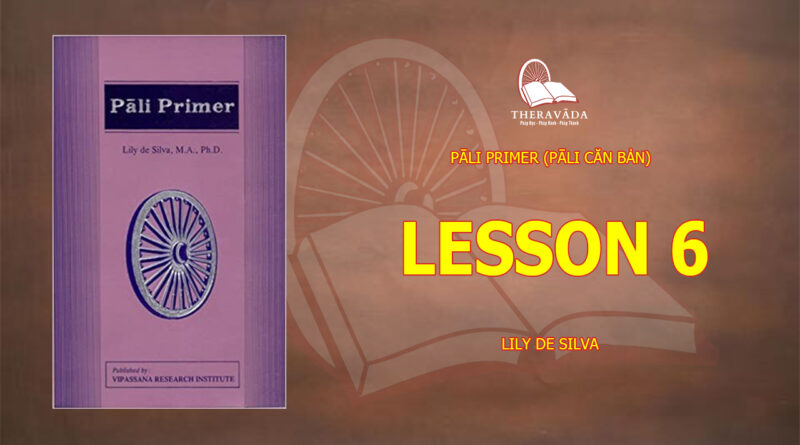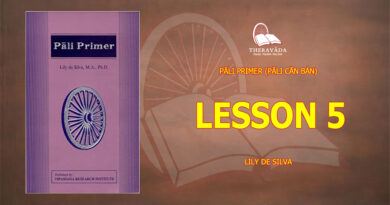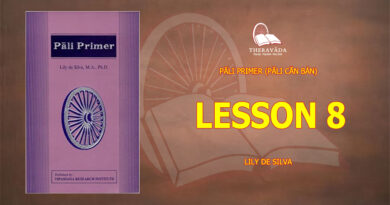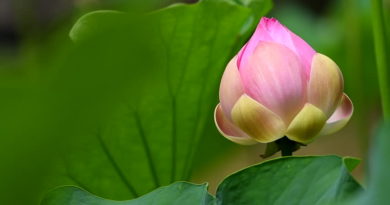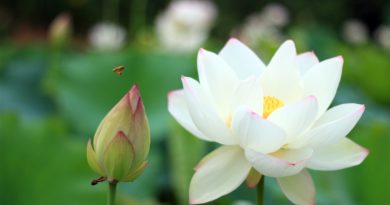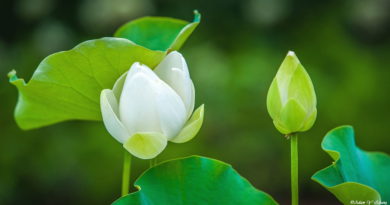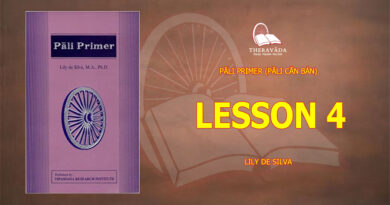Lesson 6
1. Declension of masculine nouns ending in -a (contd.)
Genetive case: The inflections of the genitive case are very similar to those of the dative case.
The case ending -ssa is added to the nominal base to form the genitive singular.
The case ending -ānaṃ is added to form the genitive plural.
Singular:
1. nara + ssa = narassa (of the man)
2. mātula + ssa = mātulassa (of the uncle)
3. kassaka + ssa = kassakassa (of the farmer)
Plural:
1. nara + ānaṃ = narānaṃ (of the men)
2. mātula + ānaṃ = mātulānaṃ (of the uncles)
3. kassaka + ānaṃ = kassakānaṃ (of the farmers)
2. Examples in sentence formation
Singular:
1. Narassa putto bhattaṃ yācati.
The man’s son asks for rice.
2. Mātulassa sahāyako rathaṃ āharati.
The uncle’s friend brings the vehicle.
3. Kassakassa sūkaro dīpaṃ dhāvati.
The farmer’s pig runs to the island.
Plural:
1. Narānaṃ puttā bhattaṃ yācanti.
Sons of the men ask for rice.
2. Mātulānaṃ sahāyakā rathe āharanti.
Uncles’ friends bring vehicles.
3. Kassakānaṃ sūkarā dīpe dhāvanti.
Farmers’ pigs run to the islands.
Exercise 6:
3. Translate into English:
1. Kassakassa putto vejjassa sahāyena saddhiṃ āgacchati.
2. Brāhmaṇassa kuddālo hatthamhā patati.
3. Migā āvāṭehi nikkhamanti.
4. Vāṇijānaṃ assā kassakassa gāmaṃ dhāvanti.
5. Mātulassa mitto Tathāgatassa sāvake vandati.
6. Amacco bhūpālassa khaggena sappaṃ paharati.
7. Vāṇijā gāme manussānaṃ piṭakehi macche āharanti.
8. Coro vejjassa sakaṭena mittena saha gāmamhā nikkhamati.
9. Upāsakassa puttā samaṇehi saha vihāraṃ gacchanti.
10. Yācako amaccassa sāṭakaṃ icchati.
11. Mittānaṃ mātulā tāpasānaṃ odanaṃ dadanti.
12. Dhīvarassa kakacena coro kukkuraṃ paharati.
13. Bhūpālassa putto amaccassa assaṃ āruhati.
14. Paṇḍitassa puttā Buddhassa sāvakena saha vihāraṃ pavisanti.
15. Suriyo manusse rakkhati.
16. Vejjassa sunakho ācariyassa sopānamhā patati.
17. Rajakā rukkhehi oruhanti.
18. Yācakassa dārakā rodanti.
19. Luddakassa puttā corassa dārakehi saddhiṃ kīḷanti.
20. Tāpaso Tathāgatassa sāvakānaṃ odanaṃ dadāti.
21. Samaṇā ācariyassa hatthena sāṭake labhanti.
22. Coro vāṇijassa sahāyakasmā assaṃ yācati.
23. Upāsakā Tathāgatassa sāvakehi pañhe pucchanti.
24. Pāsāṇamhā migo patati, luddako hasati, sunakhā dhāvanti.
25. Vejjassa patto puttassa hatthamhā patati.
26. Kumāro mātulānaṃ puttānaṃ hatthena odanaṃ dadāti.
27. Sarā luddakassa hatthehi patanti, migā pabbataṃ dhāvanti.
28. Bhūpālassa putto amaccehi saddhiṃ pāsādasmā oruhati.
29. Vejjassa soṇo kassakassa sūkaraṃ ḍasati.
30. Dhīvaro manussānaṃ macche āharati, lābhaṃ labhati.
4. Translate into Pāli:
1. The brahmin’s sons bathe with the minister’s son.
2. Uncle’s friend cooks rice with the farmer’s son.
3. The fisherman brings fish to the king’s palace.
4. The king calls the ministers’ sons from the palace.
5. The merchant’s chariot falls from the mountain.
6. The king’s ministers set out from the palace with the horses.
7. The brahmin’s doctor gives garments to the hermits.
8. The hunter’s dogs run from the mountain to the village.
9. The merchant brings a bed for the doctor’s child.
10. Deer run from the mountain to the village.
11. The teacher’s child falls from the farmer’s tree.
12. The dog eats fish from the fisherman’s basket.
13. The disciples of the Buddha go from the monastery to the mountain.
14. The hunter kills a pig with an arrow for the minister’s friends.
15. The child gets a lamp from the hands of the teacher.
16. The doctors’ teacher calls the child’s uncle.
17. The boy brings rice in a bowl for the monk.
18. Men go to the village of the lay devotees.
19. Pigs run away from jackals.
20. Monkeys play with the deer.
21. The wise man comes to the king’s island with the merchants.
22. The farmer’s children go to the mountain by their uncles’ chariots.
23. Garments fall from the carts of the merchants.
24. The recluse gets a bowl from the king’s hands.
25. The washerman brings garments for the man’s uncle.
26. King’s ministers eat rice together with the teacher’s friends.
27. Wise men protect the islands of the kings from the thieves.
28. Boys bring baskets for the fishermen from farmers.
29. The farmer’s horse drags the doctor’s vehicle away from the road.
30. Monks enter the village of the teacher.
-ooOoo-

